- Home
- Pat Barker
Another World Page 9
Another World Read online
Page 9
Cookson was a petty criminal, and the police were reluctant to rely on his evidence, but public opinion was pressing for an arrest. The creaking trolley, with its grotesquely masked burden, haunted the imagination. People had nightmares about it. What were the police doing?
Three days after the discovery of James’s body the Fanshawe children were charged with James’s murder and taken to Westgate Police Station for questioning. They denied everything and went on denying it. The great strength of their story was its simplicity. If they had been asked to account for their movements, or to supply alibis, they would almost certainly have begun to contradict themselves. But there was none of that. They were in bed, they were asleep, they knew nothing – and they said so over and over again. Their father, who, despite his grief, never wavered in his support for them, sat in on every interview. It was noticeable that during Muriel’s interviews her father’s gaze never left her face.
The first day of the trial dawned cold and bleak. People hurrying towards the Moot Hall bent their heads to battle with the wind that blew off the Tyne, carrying with it flakes of stinging snow. The courtroom smelled of wet wool, and even at noon there was a constant hissing of gas jets.
Mr Justice Lowther presided. Muriel was represented by Patrick Johnstone, probably the best defence counsel of his day; Robert by the scarcely less distinguished Nigel Walters. Both children pleaded not guilty to murder.
Cookson, whose evidence was crucial to the prosecution, proved to be a bad witness. The children, when they paused under the street lamp, had been standing beside a wall. Were they shorter than the wall, Johnstone asked, level with it, or taller than it? About level, Cookson thought. Then it could not have been Robert and Muriel Fanshawe. The wall measured five foot ten inches. Muriel, the taller of the two children, was five foot three, now, and she had grown since then. How much had Cookson had to drink? ‘A canny few,’ Cookson said. ‘A canny few,’ Johnstone repeated. Mr Justice Lowther intervened to say he could attach no meaning to the word ‘canny’ in this context. As far as he was concerned, it meant shrewd, thrifty or explicable in natural terms. ‘Were you the worse for drink?’ he asked. ‘No, my Lord, I was the better for it,’ Cookson replied. (Laughter.)
His quip did Cookson little good. Johnstone established easily enough that he had been in three or four public houses that night and had consumed ten pints or more of strong beer. Worse than that, he had been dismissed from Fanshawe’s works the previous year for drinking on the job. ‘You have a grudge against William Fanshawe, haven’t you?’ Johnstone said. ‘I know what I saw,’ Cookson insisted. But he was becoming flustered, and Johnstone moved in for the kill, thundering across the courtroom: ‘I put it to you that you saw what you wanted to see.’
It was apparent, even to those sitting in the courtroom at the time, that this was the pivotal moment of the trial. Proceedings dragged on for several more days, but it came as no surprise to anybody when the children were acquitted. The crowds who stood outside the courtroom as the Fanshawes left raised a weak cheer, but there were those who muttered, then and later, that money talked and that the Fanshawe children had got away with murder.
William Fanshawe never again spoke, or permitted anybody else to speak, of James’s death in his presence.
Bad luck continued to dog the family. Isobel, whose health had never been good, did not long survive her son. Robert was killed on the first day of the Somme. One of his brother officers wrote to William Fanshawe saying that he had seen Robert’s body impaled on the uncut German wire surrounded by unexploded British shells.
Muriel Fanshawe never married. On William’s death, Fleete House and the armaments factories, the bulk of his estate, passed to his nephew.
Robert’s last letter to Muriel, written on the eve of his death, survives. In it, he describes the columns of marching men winding along the summer lanes, singing as they went; and of how, as they passed the huge pits that had been dug in the fields on either side of the road, ready to receive the dead, the singing would falter, and for a few hundred yards there would be silence except for the tramp of feet, and then, gradually, the singing would start again. He goes on to write of the universal hope that a decisive breakthrough might be achieved, and, with a frankness unusual in such letters, of his fears that the losses would prove extremely heavy. For himself, he says, he would not mind so very much, ‘if it wasn’t for the thought of leaving you with Father and the memory of James’. The next sentence is underlined so deeply that the pen has cut through the paper: Remember how young we were.
Muriel, by contrast, always insisted on her innocence. After her father’s death she returned to Lob’s Hill. No attempt had been made to sell the house and it was never let, but kept exactly as it had been when James was alive. Like Mary Ann Cotton, Muriel was used as a bogey-woman to frighten naughty children into obedience. The neighbours avoided her. When asked why she insisted on living in a place where she was regarded with so much suspicion, she replied that she would not be forced out. On the contrary, she intended to remain in Lob’s Hill until the truth about ‘that dreadful murder’ was revealed.
It is always tempting to believe that a person who persistently maintains their innocence must indeed be innocent, but the reader may care to remember that, in the condemned cell at Durham gaol, Mary Ann Cotton wept bitterly because her mother could not visit her, though her failure to do so was entirely due to Mary Ann’s having murdered her some years before.
We do not, and cannot, know what went on in the mind of the increasingly eccentric old lady who lived alone in the house that had once been her childhood home. People passing Lob’s Hill along the lane behind the house would often see a light burning in the room with barred windows, the room that had been James’s nursery: Muriel Fanshawe’s apparently guilt-free memorial to a little boy who had always been afraid of the dark and whose first word had been ‘sadda’.
The car-park’s filled up since they arrived that morning. Rows and rows of cars, their windscreens and bumpers flashing in the sun, so many Nick feels disorientated, standing in the sparse blue shade of a pine tree, trying to remember where he’s parked.
At last he sees the Volvo, in full sun now, though he’d left it in shade. Be like a microwave. Walking towards it, his shadow ravelling round his feet, he wonders whether he should tell Fran about the Fanshawe murder. Not to tell her seems patronizing, it goes against the whole grain of their relationship, but then he remembers the flood of tears that morning. She’s exhausted, has been ever since the move, it would take very little more to push her over the edge. And he doesn’t know how she’d react. This isn’t just a sad old story; it happened in the rooms where they live and sleep and eat. The fact is nobody would knowingly buy a house in which a murder has been committed. You can tell yourself it doesn’t matter, it’s the past, it’s over, but the fact is you wouldn’t choose to do it. And Fran’s pregnant. Now more than ever she needs to feel safe. It’s not as if any useful purpose would be served by telling her… Later perhaps, when they’ve succeeded in stamping their own identity on the house. At the moment it still feels like a house-swap, with the actual owners expected back at any moment.
He opens the car boot, throws in the book, and, after a moment’s thought, pulls a plastic bin bag over it. Right, that’s settled, then.
People crowd round the circus tent, waiting for the next performance. No sign of Fran or the children. He walks towards the house and there, directly ahead of him, is Fran, strolling along towards the restaurant. He runs to catch up with her, and slips his arm around her waist. ‘Where are the children?’
‘Where’ve you been?’
‘I went for a drink. Where are they?’
‘I gave them some money for ice-creams. Did you get a guide?’
‘No, they hadn’t got any.’
Nick’s looking at the ice-cream van. There’s a short queue, but the children aren’t in it.
‘Are we going to eat here?’ Fran asks.
‘No,
let’s go to the coast, shall we? There might be a bit more of a breeze.’
The children aren’t anywhere near the ice-cream van. ‘I’ll just see where they are,’ he says casually, but then breaks into a run. Fran calls something after him, but he can’t hear. He’s panicking, telling himself not to be so bloody stupid, but there are so many streams and lakes round here, it’s no place for a toddler to be on his own. But he’s not on his own, he’s with Gareth and Miranda. Nick’s mind skitters away from the real source of his fears. He asks the man in the ice-cream van whether he’s seen three children, a fair-haired toddler with an older boy and girl. A woman standing near by, swirling her tongue round an ice-cream cone, points to a path that leads down to the largest lake.
Nick careers down the hill, jumping on to the verge to avoid an elderly couple. The path’s uneven, shelving down steeply between the roots of trees. A hundred feet below there’s a stream, its water blackish brown, flowing over black rocks. Sometimes it flashes white over miniature waterfalls, or opens into deep pools with pebble promontories. Every hundred yards or so wooden bridges span the stream. There’s a path on the other side too, narrower than this, bordered by glistening ferns that are almost as wet as the rocks. Nick crosses over and thinks he sees them, two taller figures holding a small boy by the hand. He opens his mouth to call their names, then realizes it’s a couple with their child. His children are nowhere to be seen.
The fir trees tower over him. Even the roots are above his head. Only by craning his head back can he see glints of sunlight on the uppermost branches. A warm, dark, wet, enclosed place. It reminds him of the garden at Lob’s Hill. All the trees and bushes are evergreens, their dead leaves forming a weed-killing mulch that kills everything else as well.
And then he sees them. Comes round a corner of the twisting path, and sees them, Jasper with his trainers and socks off, paddling; Miranda sitting on a rock sucking out the last drop of ice-cream from the bottom of the cone; Gareth standing on a rock in the middle of the stream, the turbulent water chafing round him.
Nick calls out, and all three children turn towards him, their faces pale in the gloom of the rhododendron bushes. They say nothing and he wonders what they see, what they make of him, this sweaty anxious adult who stands on the bridge above them, looking down.
NINE
After supper that evening, Fran and the kids settle down to watch Terminator 2:Judgement Day. It’s Gareth’s favourite, he must’ve seen it twenty times, but he never gets tired of it. Nick watches the opening scenes, and then, as pieces of dead children begin to blow across the screen, like leaves, in the nuclear wind, he retreats to the living room and starts covering up the wall painting.
White paint. No time to worry about colour schemes, he just wants the portrait covered. With a roller he draws huge swathes of emulsion across the wall; the figures disappear into a blizzard. Apple white, it says on the tin. Alzheimer white.
Nick’s shadow mimics his actions as he works. He’s the second person to do this. Fanshawe would never have entrusted the cover-up to anybody else, his pride wouldn’t have let him. Now, for the second time, the faces sink into the wall. He tries not to look at them, not to meet their gaze. According to Notable Northern Murders, Muriel always maintained that she knew nothing about how James had died, but who, looking at this picture, would have believed her? And, judging from the age of the children, this must have been painted within weeks, or months, of his death.
He leaves James till last, then kneels down and applies the paint, with a small brush, in little dabs and darts. It’s like washing Jasper’s face, he half expects James to pull away. Now the eyes. He paints over them quickly, and then, still kneeling, feeling a complete fool, says, ‘Night night.’
The rest of the wall can wait. He’s just finished cleaning the roller and brush when the phone rings. ‘I’ll get it,’ he shouts, not wanting the video watchers to be disturbed.
It’s Auntie Frieda, shrieking into the phone – she’s never really got the hang of them – saying she’s been trying to get him all day.
‘How is he?’ Nick asks, expecting the worst.
‘Home.’
‘Home? He can’t be.’
‘He is.’ She sounds elated and frightened. ‘You know the consultant said he could come home next week, but I never thought they’d send him out on a Sunday. Need the beds, I suppose.’
‘How did you get him back?’
‘Oh, the ambulance took us.’
‘How is he?’
‘Tired. Look, he wants a word. Hang on a sec.’
A long pause. Sounds of shuffling steps and laboured breathing coming closer. I should have taken them home by car, Nick thinks, torn again. If this drags on into October and the start of term there’ll be no way he can cope.
A bump and a click as the phone’s picked up.
‘How do you feel?’ Nick asks, speaking loudly, not because there’s any doubt about Grandad’s ability to hear, but because the telly’s going full blast. He sticks a finger in one ear, and crouches over the phone.
‘Fine. A lot better.’
‘Does it hurt much?’
‘Nips a bit. It’ll settle down.’
‘Have they given you anything for the pain?’
‘I think the pink pills are for that.’
‘Do they work?’
‘Nah. I don’t know where I am with them.’
Perhaps the dose is too high? Nobody knows what the right dose is for a man of 101. Geordie’s walked off the end of the graph.
‘Still, if they help the pain…’
‘Nah, hot-water bottle’s as good as anything.’
‘Have you got one?’
‘Frieda’s bringing one up now.’
‘Must be nice being in your own bed.’
‘Champion.’ He sounds exhausted. ‘Look, I’m a bit bushed, son. I’ll hand you back to Frieda, if you don’t mind.’
Frieda shouts, ‘Hello?’
‘Is he really all right?’
‘Oh, I think so.’ Doubtfully.
‘Do you want me to come over?’
‘No, we’re fine. Tell you what, why don’t you come over for tea tomorrow? Bring Miranda. It’ll do him good to have a bit of young company.’
‘All right. You’re sure you can manage tonight?’
‘Why aye, man.’
He puts the phone down and goes to find Fran.
‘Was that Frieda?’
‘Yes, he’s back home.’
‘Already?’
‘Yes.’
‘Are you going across?’
‘No, not tonight. She’s asked me to go for tea tomorrow.’ He doesn’t know how to say that only he and Miranda are invited.
Gareth says, ‘Ssh.’ And for once Nick’s glad of the interruption.
‘Will you be taking Miranda?’ Fran asks.
It’s slipped in casually, one of those quietly lethal questions Barbara used to specialize in. Since no two women could be less alike, he’s forced to conclude he’s the type of man who inspires lethal questions. ‘Yes.’
She nods.
‘What’ll you do?’
‘Take Gareth shopping. He needs school shoes.’
She comes out on to the drive to say goodbye, a surprisingly fond farewell for so short a separation. Because the family’s splitting into its constituent parts, they need to be gentle with each other. As she bends into the car to kiss him, he grasps her hand and she winces as the wedding ring bites. ‘Don’t wear yourself out,’ he says.
Once they’re on the road, Miranda stares out of the window at the passing fields, and Nick’s grateful for the silence. He needs to prepare himself. The morning call from Frieda hadn’t been reassuring. She was going to try to get some sleep, she said, while Grandad was watching cricket. ‘How was the night?’ Nick asked. A second’s hesitation. ‘A bit lively.’
Nick stops outside the house and sees, with a jolt of fear, that the curtains are drawn. Well, she’s asleep, it m
eans nothing. All the same he tells Miranda to stay in the car and tries the door. Locked. He rings the bell and a pink face blurred behind frosted glass surfaces to meet him. Frieda’s voice: ‘Who is it?’
‘Me.’
She unlocks the door. Doesn’t need to say anything, for there, framed in the open door of the living room, is Geordie, wrapped in a dressing-gown, watching television. Not dead, not yet, though Nick can see, even in the dim light reflected from the screen, that it won’t be long. He’s aged twenty years in the past week. Not in the sense of being more wrinkled or stooped, he’s simply thinner. When he reaches up to receive Nick’s hug his dressing-gown falls open and beneath the skin Nick sees, not merely ribs, but the beating of his heart. He’s become a skeleton leaf. The merest breath of wind would blow him away, and yet he’s still upright. Still the sunken eyes are clear.
‘How’s it going, Grandad?’
‘Bloody awful. There’s only Atherton in double figures.’
No way of telling whether the misunderstanding’s genuine or whether he’s simply determined not to talk.
‘I meant, how are you feeling?’
‘Not so bad. Got the stitches out.’
Almost boastfully, he pushes down his pyjama trousers to show the wound, wounds rather. Beside the bayonet wound, Shepherd’s handiwork looks almost prissily neat. A surgical incision: nothing like this ancient scar, this relic of an attempt at gutting a human being. ‘It’s going on well, isn’t it? Does it hurt?’
‘A bit.’ But it’s the bayonet wound he’s cradling in his hand.
‘I’ve brought Miranda to see you.’
‘Oh, good.’
Is it Nick’s imagination, or is there a fractional hesitation, a shadow of doubt, as to who Miranda is?

 Border Crossing
Border Crossing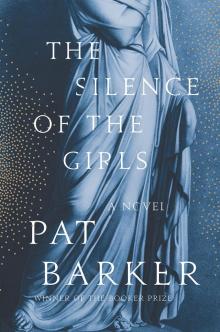 The Silence of the Girls
The Silence of the Girls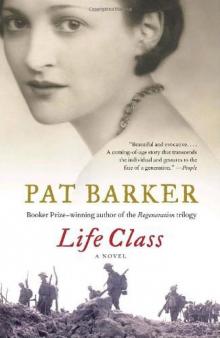 Life Class
Life Class Regeneration
Regeneration Another World
Another World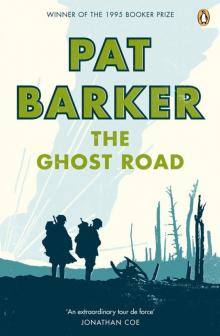 The Ghost Road
The Ghost Road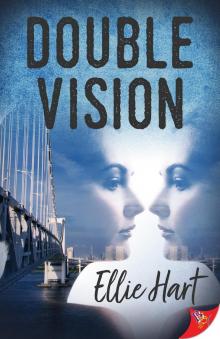 Double Vision
Double Vision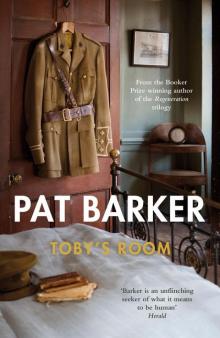 Toby's Room
Toby's Room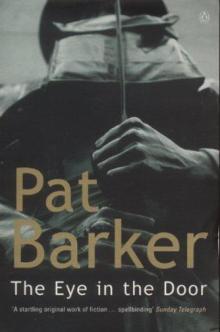 Regeneration Trilogy 02 - The Eye in the Door
Regeneration Trilogy 02 - The Eye in the Door The Eye in the Door
The Eye in the Door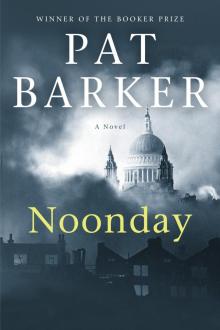 Noonday
Noonday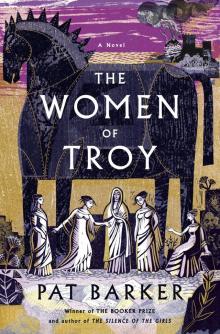 The Women of Troy: A Novel
The Women of Troy: A Novel